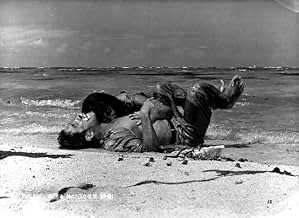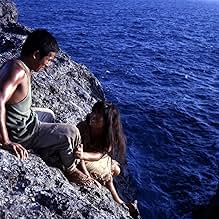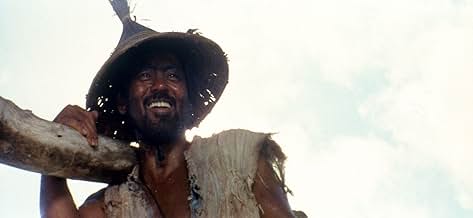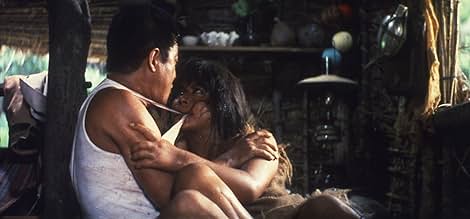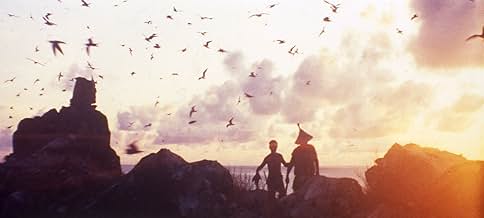Füge eine Handlung in deiner Sprache hinzuAn engineer from Tokyo arrives on a drought-ridden tropical island to drill a well to power a nearby sugar mill. He meets the inbred Futori family, hated by the locals for breaking religious... Alles lesenAn engineer from Tokyo arrives on a drought-ridden tropical island to drill a well to power a nearby sugar mill. He meets the inbred Futori family, hated by the locals for breaking religious customs.An engineer from Tokyo arrives on a drought-ridden tropical island to drill a well to power a nearby sugar mill. He meets the inbred Futori family, hated by the locals for breaking religious customs.
- Regie
- Drehbuch
- Hauptbesetzung
- Auszeichnungen
- 5 Gewinne & 1 Nominierung insgesamt
Empfohlene Bewertungen
The film's successes are its luscious landscape, evocative production design of heathen and pagan rituals and artifacts, and portrayal of suppressed, taboo desires bursting to the fore. The narrative wanders and explores various tangents that can challenge the attention. This is filmmaking for cinema, and the gorgeous golden beaches and turquoise oceans had me longing to see this on the big screen. A murder by masked men at the end is also visually compelling. This film is interesting in bits, and flashes of genius occasionally show themselves, but the lack of coherence, repetition in the storyline, and outright dud moments (the heavenly vision of the departed patriarch), make this a problematic addition to the Imamura oeuvre. It hints at the great film that this project could have become, a realization of the potential of the vision, rather than the vision itself. Sometimes amazing, sometimes disappointing, this is one to watch and argue over.
Imamura's view of humanity is a curious blend of pessimism and deep, resonant humor to the extent that they seem to cancel each other out. Perhaps this is why his films are so peculiarly observant, and indeed anthropological. In this respect he's successful both as a "realist" (a notion I'm not fond of in the domain of film but which I use here complimentarily) and a visual poet. In fact, some portions of this film strongly foreshadow Malick's "The Thin Red Line" (1998) in the visual depiction of the narrative role of nature.
All of the Imamuras I know have an image (motif) or a scene that become a kind of hub; definitions of the films and something that stay and live on in the memory. In this film there are many, but two images glow strongest: the pit that Nekichi and the Futoris have been digging for years, as well as the final climax at sea.
On the dedicated forum for this film it has been suggested that there are many parallels between this and Teshigahara's "Suna no onna" (1964). I think that's a connection worth acknowledging and at best it enriches both films.
At this writing this film has received only 475 votes, which is a very small number considering this film has been available on Blu-ray courtesy of the Masters of Cinema series (Region B) for two and a half years.
This movie has a rich and distinctive rhythm, immersing itself in the natural world. Sometimes sort of funny in a messed up way, it also has a very dark core.
I especially liked the humdrum little clerk finding a new part of himself in his relationship with the mentally disabled girl. I don't know if it's an insensitive portrayal but it adds to the movie's rawness.
I've never seen a movie quite like it even if I ultimately watched it in two sittings.
Profound Desire of the Gods immerses one, for nearly three hours, in the community of Kurage, located in the in the tropics, on a small island with jagged cliffs, lost in the middle of the Pacific. Its amazing, from the wide and exotic photo to the allegorical representations of the human condition.
Wusstest du schon
- WissenswertesOfficial submission of Japan for the 'Best Foreign Language Film' category of the 42nd Academy Awards in 1970.
- Zitate
Yamamori Futor: He shouldn't take money. The engineer is a god who came from beyond the sea. It will not do to take money for serving that god.
- VerbindungenFeatured in Cinéma, de notre temps: Shohei Imamura, le libre penseur (1995)
Top-Auswahl
- How long is Profound Desires of the Gods?Powered by Alexa
Details
- Erscheinungsdatum
- Herkunftsland
- Sprache
- Auch bekannt als
- Profound Desires of the Gods
- Drehorte
- Ishigaki-jima, Ryukyu Islands, Japan(Spelling error)
- Produktionsfirma
- Weitere beteiligte Unternehmen bei IMDbPro anzeigen
Zu dieser Seite beitragen


